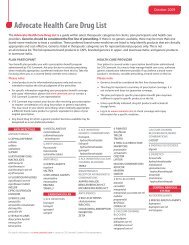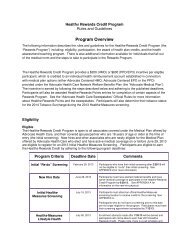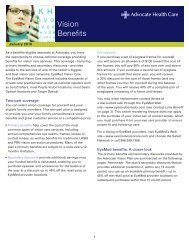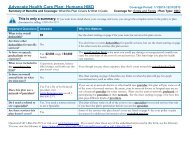PPO/DRP Medical Plan - Advocate Benefits - Advocate Health Care
PPO/DRP Medical Plan - Advocate Benefits - Advocate Health Care
PPO/DRP Medical Plan - Advocate Benefits - Advocate Health Care
Create successful ePaper yourself
Turn your PDF publications into a flip-book with our unique Google optimized e-Paper software.
Ambulance Service<br />
The <strong>PPO</strong>/<strong>DRP</strong> covers the cost of ambulance<br />
services for ground transportation for you or a<br />
covered family member from the place where an<br />
injury or serious medical accident occurs to the<br />
nearest hospital where appropriate treatment can<br />
be given.<br />
Non-emergency ambulance services are covered<br />
only if required to transport you or a covered<br />
family member to or from a hospital or between<br />
hospitals for required treatment, but only if the<br />
ambulance service is medically necessary.<br />
Note: Air ambulance services are covered only if<br />
approved by the <strong>PPO</strong>/<strong>DRP</strong> administrator.<br />
Behavioral <strong>Health</strong> <strong>Care</strong><br />
The <strong>PPO</strong>/<strong>DRP</strong> covers hospital treatment for<br />
behavioral illness and substance abuse services;<br />
however, inpatient services must be pre-certified;<br />
to initiate the pre-certification process, call the<br />
number shown on your coverage ID card.<br />
Important! If you have inpatient behavioral<br />
health care services that are medically<br />
necessary but not pre-certified, you will pay<br />
50% of the cost of these services up-front<br />
(out of your own pocket) based on either<br />
the negotiated rate or actual cost of the<br />
service, as appropriate; the proper benefit<br />
percentage—depending on whether you see<br />
a participating or nonparticipating provider—<br />
will then be applied to the remaining<br />
50% of the cost. You may be required to<br />
pay the entire cost of services you have<br />
received if certification is denied or if it is<br />
later determined that the services were not<br />
medically necessary.<br />
While it is not necessary to pre-certify outpatient<br />
behavioral health services, you may contact the<br />
behavioral health certification unit for assistance<br />
in selecting a provider.<br />
20<br />
Behavioral Illness and Substance Abuse Treatment<br />
The <strong>PPO</strong>/<strong>DRP</strong> pays benefits for care to treat a<br />
behavioral illness or substance abuse. This type<br />
of care includes inpatient hospital confinement,<br />
psychotherapy, group therapy and psychological<br />
testing and—for treatment of a behavioral<br />
illness—electro-convulsive therapy or convulsive<br />
drug therapy and family counseling. <strong>Care</strong> must<br />
be provided by a physician, psychologist, clinical<br />
social worker or clinical professional counselor.<br />
<strong>Benefits</strong> are available if you:<br />
Are an inpatient in a hospital, skilled<br />
nursing facility or behavioral health/substance<br />
abuse facility<br />
Are a patient in a partial hospitalization<br />
treatment program or coordinated home care<br />
program, or<br />
Receive individual or group outpatient<br />
behavioral disorder/substance abuse treatment<br />
services from a physician, psychologist or<br />
clinical social worker.<br />
What is considered a behavioral illness?<br />
A behavioral illness is a disease that is<br />
commonly understood to be a mental<br />
disorder whether or not it has a physiological<br />
or organic basis. Treatment is generally<br />
provided by or under the direction of a<br />
behavioral disorder professional.

















